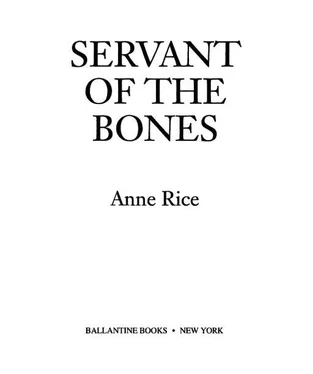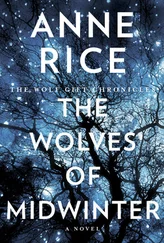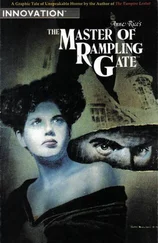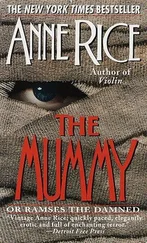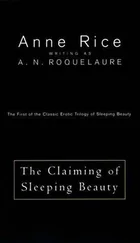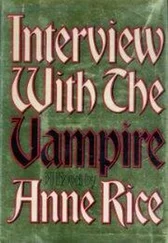“That was Gregory Belkin’s daughter, that’s who that was,” the man said, “That was Esther Belkin.”
“Belkin’s daughter—”
“…Temple of the Mind.”
“Temple of the Mind of God. Belkin.”
What did these words mean to me?
Master! Where are you? Name yourself or show yourself! Who has called me? Why have I been made to witness this!
“Gregory Belkin’s little girl, the Minders—”
Which way?
I began to fade. I felt it swift and terrible as it always is, as surely as if the Master had commanded all the artificial and gathered particles of me, as it is written, Return now to your place . Just for a moment, I clung to the storm of matter, commanding it to sheathe me, but my cry was a wail. I stared down at my hands, my feet, such filthy shoes, cloth and string and leather shoes, slippers more than shoes, shoes on the pavement:
“Azriel, stay alive!” came the voice from my mouth.
“Take it easy, son,” said the man beside me. And he looked at me as if he felt sorry for me. He lifted his arm to embrace me. I put my hand up. I saw the tears.
But the wind had come, the wind that comes for all spirits. I was losing my hold.
The man was looking for me and he couldn’t find me, and he didn’t know why, and thought it was his own confusion.
Then he and all those with him—and the great city—was gone too.
I was nothing now, nothing.
I struggled to see the crowd below, but I couldn’t find the spots where the Evals lay dead in their blood still or were being taken away with such care as the queen with her dark hair, the goddess who had died seeing me. She had said it, I heard it, she had said, “Azriel, the Servant of the Bones.” I had heard her as a spirit hears, though the man in the car with her might not hear something so small and tragic as her whisper.
The wind took me. The wind was filled with the wail of the souls, faces bearing down upon me, hands seeking to grip me, and turning my back on it as always, I let go. I saw the last dim outline of my hands for one instant; I felt the form of arms and legs; I felt the tears on my face. Yes, I felt that. Then I was a goner.
Into the bones, Azriel . I was safe.
So there you have the picture! Masterless, risen, to witness this, to avenge it? Why? The darkness overcame me like a drug. Safe, yes, but I didn’t want to be safe; I wanted to find the man who had sent those Evals to kill her.
15
Time passed.
I felt it more intensely than usual. I knew that I was listening. I was there. I knew what the world was now, more or less, as always. Bear with me. I knew what men and women knew—those whom I’d seen and touched in the New York street.
The particulars made a moral impression. Emotion gradually accompanied the synthesis of knowledge. Ghosts don’t have to interpret Ghosts don’t have to be amazed, or shocked.
But the mind of the ghost, unfettered by flesh, can gather to itself indiscriminately and perhaps infinitely the sum of what is shared or valued by nearby human minds.
Awake once more in the darkness, I grasped the general and the spectacular—that we were nearing the end of the twentieth century of what men call the common era, that fossil fuel and generated electricity were indispensable to the everyday methods of eating, drinking, sleeping, communicating, traveling, building, and fighting, that micromachines of exquisite circuitry could store information in abundance, and that vivid moving pictures in which people appeared and spoke could be transmitted by waves or over tiny delicate fibers more precious than spun glass.
Waves. The air was full of waves. Full of voices speaking both privately and publicly—from telephones, through radios, televisions. The world was as fully surrounded by voices now as it was by air itself.
And the earth was indeed round. Not a mile of it remained uncharted, unowned, or unnamed. No part of it lay beyond communication because the mysterious waves of telephones, radios, and televisions could be bounced off satellites in space and back to earth again at any locale. Sometimes the television pictures and voices were of people and actions taking place at the very moment they were being transmitted: known as live TV.
Chemistry had reached unprecedented heights, achieving through extraction, purification, analysis, and new combinations all manner of new substances, materials, drugs. The very process of combining had been transformed so that there was now physical change, chemical change, chain reaction, chemical reaction, and fusion, to name but a few. Materials had been broken down and made into new materials and the process was without limit.
Science had surpassed the alchemist’s dreams.
Diamonds had found their way into the bits of drills, yet people still wore them as ornaments and they commanded millions of dollars, which was, apparently a preferred currency, American dollars, though the world was full of currencies and languages, and people from Hong Kong spoke to people in New York merely by pressing a few buttons. The catalog of synthetic materials and subsequent products had evolved beyond the memory or understanding of the common man so that almost nobody could define for you the ingredients of the nylon shirt he wore, or the plastic calculator in his pocket.
Of course some conclusions—even for me—were inevitable. A car or plane dependent on the combustion of fossil fuel can explode rather than move forward. Bombs can be sent without pilots from one country to another to destroy even the biggest cities with the highest buildings. Hardly anywhere in the world did the sea not taste just a little of gasoline.
New York was very far north of the equator, that was obvious, and one could say it was the capital, in this time, in the Western world.
The Western world. This is where I have found myself. And what is the Western world? Apparently, the Western world was the direct cultural legacy of the Hellenism of Alexander the Great, its concepts of justice and purity infinitely amplified and complicated but never really subverted by Christianity of varying kinds—from crude screaming mystic acceptance of Jesus to dense theological sects which still argue over the nature of the Trinity, that is, whether or not there are three persons in one God. Scarcely a single part of the Western world had not been enriched and invigorated by an immensely creative and relentlessly spiritual Judaism. Jewish scientists, philosophers, doctors, merchants, and musicians were among the most celebrated of the era.
The drive to excel was taken for granted, as it was in Babylon. Even by those in despair.
Natural law and law arrived at by reason had become common values, revealed law and inherited law on the other hand had become suspect and subjected to argument, and all human fives now were “created equal.” That is, the life of a worker in the fields was as precious as the life of the titular Queen of England or her elected Prime Minister.
Technically, legally, there were no slaves.
Few were certain as to the meaning of life, as few today as there had been in those times when I was alive.
Once in the scriptorium as a human boy I had read in Sumerian the lament: “Who has ever known the will of heaven?” Any man or woman in the streets of New York today might have spoken the same words.
This Western world, this legacy of Hellenism, infused with ever evolving Judaism and Christianity, had flourished most dramatically in northern climes of the planet both in Europe and in America, harnessing somehow the tenacity and the ferocity of those taller, shaggier, and often fairer dwellers of the woodlands and the steppes, who did not learn to be humans in Eden, but rather in lands where summer was always followed by the brutality of cold and snow.
Читать дальше
